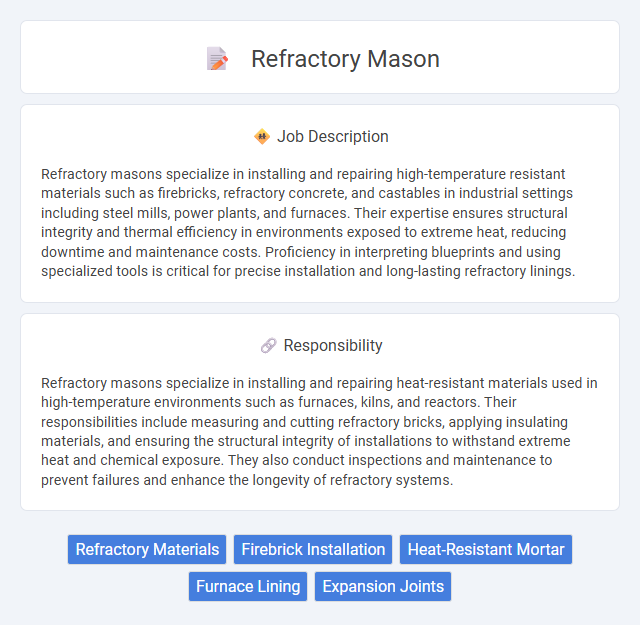
Refractory masons specialize in installing and repairing high-temperature resistant materials such as firebricks, refractory concrete, and castables in industrial settings including steel mills, power plants, and furnaces. Their expertise ensures structural integrity and thermal efficiency in environments exposed to extreme heat, reducing downtime and maintenance costs. Proficiency in interpreting blueprints and using specialized tools is critical for precise installation and long-lasting refractory linings.
Individuals with strong physical stamina and good hand-eye coordination are more likely to thrive in a refractory mason job due to the demanding nature of handling heavy materials and working in high-temperature environments. Those who are comfortable working in confined spaces and have no respiratory issues might be better suited for this role, given the exposure to dust and heat. People with a preference for precision and safety-conscious behavior tend to be more successful and satisfied in this occupation.
Qualification
Refractory masons must possess specialized skills in installing and repairing heat-resistant materials used in industrial furnaces, kilns, and reactors. Qualifications typically include experience in handling refractory bricks, castables, and mortars, along with a strong understanding of thermal expansion and material properties. Certification or apprenticeship training in masonry and industrial refractory techniques is highly preferred to ensure safety and precision in high-temperature environments.
Responsibility
Refractory masons specialize in installing and repairing heat-resistant materials used in high-temperature environments such as furnaces, kilns, and reactors. Their responsibilities include measuring and cutting refractory bricks, applying insulating materials, and ensuring the structural integrity of installations to withstand extreme heat and chemical exposure. They also conduct inspections and maintenance to prevent failures and enhance the longevity of refractory systems.
Benefit
Working as a refractory mason likely offers the benefit of specialized skill development in high-demand industrial sectors such as energy, manufacturing, and construction. There is a probability of earning competitive wages due to the technical nature of the work and the hazardous environments often encountered. Benefits may also include opportunities for overtime, job stability, and advancement within the trade or related fields.
Challenge
Refractory masons likely face significant challenges due to the demanding physical nature and precise skills required to install heat-resistant materials in extreme environments. The probability of encountering hazardous working conditions, such as high temperatures and confined spaces, increases the complexity of the job. These factors may contribute to a constant need for vigilance, technical expertise, and adherence to safety protocols.
Career Advancement
Refractory masons, skilled in installing and repairing heat-resistant materials in industrial settings, can advance their careers by gaining certifications in specialized techniques such as spray-on linings and ceramic fiber applications. Mastery of advanced material science and proficiency in blueprint reading often lead to supervisory or project management roles within construction and manufacturing industries. Continuous training enhances opportunities for working on large-scale projects in power plants, steel mills, and oil refineries, driving career growth and higher earning potential.
Key Terms
Refractory Materials
Refractory masons specialize in installing, repairing, and maintaining refractory materials such as firebricks, castables, and ceramic fibers that withstand extreme temperatures in industrial furnaces, kilns, and reactors. Their expertise ensures the structural integrity and thermal efficiency of high-heat environments by applying and aligning heat-resistant materials to prevent damage and energy loss. Proficiency in cutting, shaping, and bonding refractory components is essential for optimizing performance in petrochemical plants, steel manufacturing, and power generation facilities.
Firebrick Installation
Refractory masons specialize in the precise installation of firebrick materials designed to withstand extreme temperatures in industrial furnaces, kilns, and boilers. Their expertise ensures proper alignment, cutting, and fitting of high-quality firebricks to maximize thermal efficiency and structural integrity. Skilled firebrick installation minimizes heat loss and resists chemical erosion, crucial for maintaining safe and durable high-temperature environments.
Heat-Resistant Mortar
Refractory masons specialize in installing and repairing heat-resistant mortar essential for constructing and maintaining high-temperature industrial structures like furnaces, kilns, and boilers. Heat-resistant mortar provides critical thermal insulation and structural integrity by withstanding extreme temperatures up to 3000degF, preventing damage and ensuring long-term durability. Expertise in selecting and applying refractory mortar types such as fire clay, silica, or alumina-based compounds is vital for optimizing heat resistance and minimizing thermal stress in industrial environments.
Furnace Lining
Refractory masons specialize in constructing and repairing furnace linings using heat-resistant materials such as firebrick, castable refractories, and insulating bricks to protect industrial furnaces from extreme temperatures. Their expertise ensures the structural integrity and thermal efficiency of blast furnaces, kilns, and other high-temperature processing units. Proper installation and maintenance of refractory linings prevent energy loss, reduce downtime, and extend the operational lifespan of industrial heat equipment.
Expansion Joints
Refractory masons specializing in expansion joints install and maintain heat-resistant materials that accommodate thermal movement in industrial equipment such as furnaces and boilers. Precision in placing expansion joints ensures durability and prevents structural damage caused by high temperatures and mechanical stress. Expertise in materials like ceramic fiber, metal alloys, and specialized firebricks enhances the efficiency and lifespan of refractory installations in power plants and petrochemical facilities.
 kuljobs.com
kuljobs.com